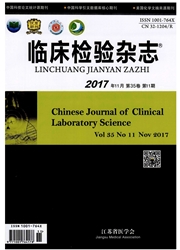

 中文摘要:
中文摘要:
目的探讨人脐带间质干细胞来源的exosomes(hucMSC-Ex)对四氯化碳(CCL4)诱导的肝细胞氧化应激损伤的保护作用。方法将体外培养的人肝细胞系HL7702分为对照组(常规培养)、CCL4损伤组及hucMSC-Ex处理组(CCL4+hucMSC-Ex)。免疫荧光检测CM-Dil染料标记的hucMSC-Ex进入HL7702细胞的情况;免疫组织化学法分析细胞过氧化物8-羟基脱氧鸟嘌呤(8-OHdG)的表达水平;比色法检测培养上清中谷胱甘肽(GSH)和丙二醛(MDA)的含量;western blot分析P38MAPK通路的活化情况。结果免疫荧光结果显示,hucMSC-Ex可转移进入HL7702细胞;比色法结果表明,与对照组相比,CCL4损伤组HL7702细胞培养上清中GSH含量下降,MDA上升(P〈0.01),hucMSC-Ex处理组GSH和MDA含量无显著性变化;免疫组化结果显示,与对照组相比,CCL4损伤组8-OHdG表达阳性的HL7702细胞(胞核棕黄色)数量明显增高,而hucMSC-Ex处理组阳性细胞数量无明显变化;western blot结果表明,CCL4损伤组P-P38蛋白表达水平明显上升,而hucMSC-Ex处理组P-P38蛋白表达下降,其P-P38与P38/GAPDH蛋白的灰度值较CCL4损伤组下降约2.4倍。结论 HucMSC-Ex可减轻CCL4诱导的肝细胞过氧化损伤。
 英文摘要:
英文摘要:
Objective To investigate the protection of exosomes derived from human umbilical cord mesenchymal stem cells ( hucMSCEx) on the oxidative damage of hepatocytes induced by carbon tetrachloride (CCIA). Methods Human hepatocytes (HL7702) cultured in vitro were divided into three groups, including the control (conventional culture) , the CCL4-trcated group and the hueMSCsEx group treated with CCIA and hucMSC-Ex simultaneously. The CM-Dil labeled hucMSCs-Ex entered into hepatocytes was determined by the immunofluorescence method. The expression of peroxide 8-hydroxydeoxyguanine (8-OHdG) in HL7702 cells was detected by the immunohistoehemical method. The levels of glutathione (GSH) and malondialdehyde (MDA) in culture supernatant of HL7702 cells were detected by the colorimetry, and the activation of pathway P38MAPK by western blot. Results The hucMSC-Ex can enter into HL7702 cells. When compared with the control group, the level of GSH in culture supernatant of HL7702 cells in the CCIA-treated group significantly decreased, while the level of MDA increased (P 〈 0.01 ). However, there was no significant difference of GSH and MDA levels between the hucMSC-Ex group and the control. Immunohistochemistry showed that when compared with the control, the number of HL7702 cells expressing 8-OHdG ( brown nucleus) in the CCL4-treated group significantly increased, while there was no significant change in the hucMSCs-Ex group. Western blot showed that hucMSC-Ex inhibited the activation of pathway P38MAPK induced by CCL4, and the gray value of P-P38/GAPDH in the CCL4-treated group was about 2.4 times higher than that in the hucMSCEx group. Conclusion HucMSC-Ex may alleviate the oxidative damage of hepatocytes induced by CCL4.
 同期刊论文项目
同期刊论文项目
 同项目期刊论文
同项目期刊论文
 期刊信息
期刊信息
